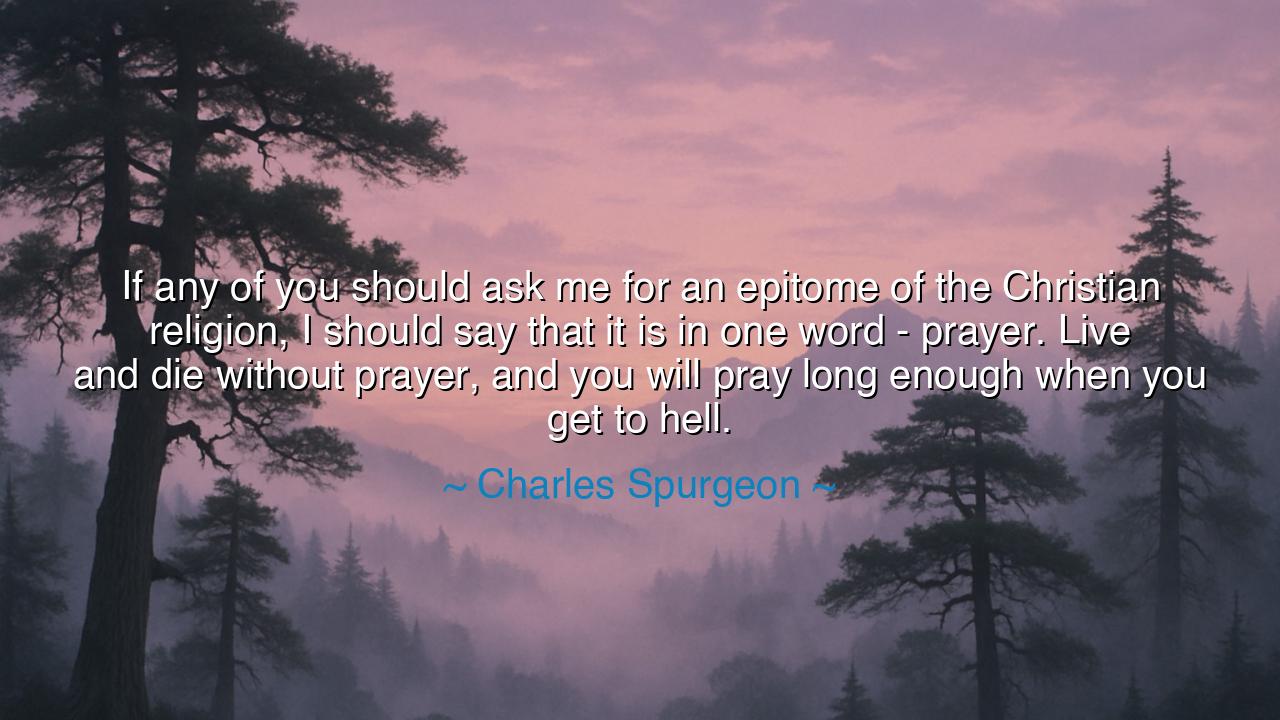
If any of you should ask me for an epitome of the Christian
If any of you should ask me for an epitome of the Christian religion, I should say that it is in one word - prayer. Live and die without prayer, and you will pray long enough when you get to hell.






In the quiet depths of human spirit, there lies a profound truth that transcends all faiths, all traditions, and all boundaries: that prayer is the bridge between the earthly and the divine. Charles Spurgeon, the great preacher of the Victorian era, speaks with fiery conviction when he declares, "If any of you should ask me for an epitome of the Christian religion, I should say that it is in one word - prayer." This is not a simple plea for words or rituals but a call to the very core of what it means to live in communion with the divine. Prayer is not just a practice; it is the very heart of Christianity, the essence of relationship between man and his Creator.
In the ancient world, prayer was seen as the soul's most sacred act, a direct conversation with the divine. The prophets, the kings, the sages—they all understood that in moments of prayer, the veil between heaven and earth grew thin, and the divine presence could be felt. But Spurgeon's words pierce the soul with even greater urgency: to live and die without prayer is not merely to neglect an act, but to sever oneself from the very lifeblood of faith. For without prayer, one is left adrift in a world of distractions and temptations, too distant from the divine to feel its presence, and too far from the heart of Christianity to know its true power.
Consider the story of Daniel, the great prophet, who, in the face of great peril, never ceased his practice of prayer. Even when the king decreed that no man should offer prayer except to him, Daniel opened his window and prayed three times a day, as was his custom. It was not because the law was unjust, but because prayer was the source of his strength, his courage, and his clarity. In his act of defiance, Daniel showed that prayer is not just an act of devotion but a lifeline that connects us to the divine wisdom and protection. Had Daniel turned away from his prayer, he would have turned away from his very source of power and peace.
Spurgeon's sharp warning—that those who live without prayer will one day find themselves praying in hell—is not a threat, but a call to wakefulness. For hell is not merely a place of fire and brimstone but a state of spiritual separation. To be cut off from God, to live without communion through prayer, is to experience a kind of hell even in this life. The person who neglects prayer may have no concept of the depths of their isolation, but in the end, they will feel it. Prayer, in its purest form, is not about asking for favors or deliverance, but about opening the heart to the divine, surrendering to the will of God, and acknowledging the truth of our dependence upon Him.
In every moment of prayer, we acknowledge that we are not self-sufficient, that we are not in control of the vast forces that shape our lives. This is the great humility of Christianity, that we are but creatures, and God is the Creator. Spurgeon reminds us that to live without this acknowledgment, to live in pride and self-sufficiency, is a form of spiritual death. The soul that refuses prayer is a soul that says, "I need no guidance, no help, no grace." But such arrogance leads only to emptiness and despair, for we were made to seek communion with the divine, to open our hearts and voices in prayer.
The lesson Spurgeon imparts is one of urgency and reflection: the Christian religion, in its essence, is a call to prayer. Without it, one drifts away from the heart of faith, too consumed by the world to remember the divine. But in prayer, we find our true purpose and connection. The prayerful life is not merely about seeking deliverance in times of need, but about cultivating an ongoing relationship with the divine, an intimacy that transforms us, renews us, and leads us toward our true purpose. Prayer is the pulse of the soul, the act that keeps us connected to the divine will and purpose, and it is through this act that we find life—both in this world and the next.
As you move through the days of your life, ask yourself: Do you begin and end your days in prayer? Do you seek the divine presence in every moment, in the joy and in the sorrow, in the triumph and in the struggle? Spurgeon calls us to recognize the profound truth of prayer—that it is not a mere ritual, but the very heart of Christian life, the means by which we connect to the divine and receive the strength we need. Let us not live without prayer, for to do so is to live in spiritual isolation. Instead, let us make prayer the center of our lives, and through it, find the peace and strength to live as we were always meant to.






AAdministratorAdministrator
Welcome, honored guests. Please leave a comment, we will respond soon